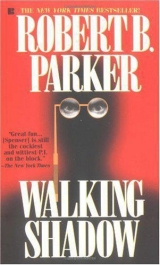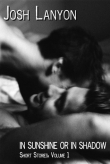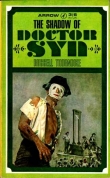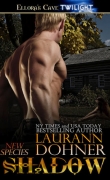
Текст книги "Walking Shadow"
Автор книги: Robert B. Parker
Жанр:
Крутой детектив
сообщить о нарушении
Текущая страница: 2 (всего у книги 14 страниц)
CHAPTER 4
Most people having dinner Upstairs at the Pudding had never seen anyone who looked like Hawk. At 6' 2" he weighed 210 and had a 29-inch waist. He was monochromatic tonight. Black skin, black eyes, black suit, black shirt, black tie, black boots. His head was clean-shaven.
"This place is so Cambridge," Susan said, "it gives me goose bumps."
"Cambridge give you goose bumps?" I said to Hawk.
"Hives," Hawk said.
The main dining room had a thirty-foot ceiling, and the dark green walls were decorated with posters advertising Hasty Pudding Club productions dating back to the early nineteenth century. We sat at a table outside on the patio deck.
"Think maybe I'm integrating the place?" Hawk said.
"You're so sensitive," Susan said.
"There was a Kenyan diplomat in here just last year."
Hawk grinned.
"Don't smile," I said.
"Ruins the look."
Susan was busily waving at people.
"You're like the Mayor here," Hawk said.
"And rightly so," Susan said.
The waitress came and took our order.
"Well, nobody following your Greek," Hawk said.
"I been on his tail since you called me."
"You think the shadow saw you?" Susan said.
Hawk stared at Susan as if she'd spoken in tongues.
"I beg your pardon," Susan said.
"Sure," Hawk said.
"Could mean the shadow heard about me."
"Which would make him likely part of the theater company, or at least someone in Christopholous' circle," I said.
"Un huh. Or the murder stirred everything up and scared him off," Hawk said.
"Or?"
"Or Christopholous made him up," Hawk said.
"Or her," Susan said.
Hawk and I both smiled, and nodded.
A young couple with a baby stopped at our table.
"This is my friend, Diane," Susan said.
"And her husband, Dennis. And their daughter, Lois Helen Alksninis."
Hawk put his finger out and the baby grabbed it.
"Name's bigger than the kid," Hawk said.
"What kind of name is that?"
"A hard one," Dennis said and Hawk grinned. Lois Helen let go of his finger. And they moved on to their table.
"Did you speak to that policeman?" Susan said.
"DeSpain? Yeah. I went over this morning."
"DeSpain?" Hawk said.
"State cop? Big blond guy, stone eyes?"
"Yeah," I said.
"Except now he's Chief in Port City."
"Port City a tough town," Hawk said.
"I know."
"DeSpain a tough guy," Hawk said.
"What a coincidence," I said.
A lean, outdoors-looking man in a blue blazer passed us on his way to the door. He saw Hawk and nodded slightly. Hawk nodded back.
"Who's that?" Susan said.
"Hall Peterson," Hawk said.
"Do some investments for me."
"Investments, Hawk?" Susan said.
"You never cease to amaze."
"Never," Hawk said.
"Victim's name was Craig Sampson," I said for Hawk's benefit.
I looked at Susan.
"What do we know about him?"
"He was forty-one, forty-two," Susan said.
"Single. Poor family. Never went to college. He went to acting school at night on the GI Bill, or whatever they call it now, and waited on table, and worked for a caterer, and for a home cleaning service, and painted apartments, and lived in hideous little one-room walkups downtown in New York, and all the other awful stuff you do if you want to be an actor, and finally he auditioned for the Port City Company last year and made it."
"That's all?"
"Doesn't seem like much, does it," Susan said.
"Not going to be more," Hawk said.
Susan nodded. Hawk and I were quiet. There were trees growing up around the patio dining room, and plants along the railing.
There was no roof. The effect was of dining in a private treehouse in a lush garden, although we were twenty feet up from Harvard Square. Overhead, small lights strung along the beamed superstructure twinkled like captive stars, above them the darkness ascended infinitely. I looked at Susan across the table. Her eyes seemed as deep as space; and I felt, as I always did when I looked at her, as if I were staring at eternity. I half expected Peter Pan to cruise in and make me young again.
"You want me to stay on the Greek?" Hawk said.
"Christopholous, yes."
"And if I see a shadow you want me to grab him.. he looked at Susan… "or her?"
"It would be nice if we could chat with him… or her."
"What you going to do?" Hawk said.
"Susan and I are going to a reception and board meeting at the theater," I said.
"What could be better," Hawk said.
"How about getting whacked in the nose with a brick?" I said.
"Well, yeah," Hawk said.
"That would be better."
Susan gazed up at the night sky.
"One and a half billion males on the planet and I'm having dinner with Heckel and Jeckel," she said.
The entrees arrived. Susan cut her tuna steak in two and put one half of it aside on her butter plate. Hawk watched her.
"Trying to lose some weight?" Hawk said in a neutral voice.
"Yes. I have three or four pounds of disgusting fat that I want to get rid of."
Hawk said, "Un huh."
"I know, maybe you can't see it, but it's there."
Hawk looked at me.
"I've missed it too," I said.
"And I'm a trained detective."
"Remember where we are," Susan said.
"I could have you both arrested for sexual harassment."
"I counter with the charge of racial insensitivity," Hawk said.
"Yes," Susan said.
"That would be appropriate. Then we join forces against our common oppressor."
They both turned and gazed at me.
"The white guy," I said.
CHAPTER 5
Susan and I met Christopholous in the conference room upstairs, where board members and invited guests milled thirstily around the open bar.
"Please call me Jimmy," Christopholous said.
"It's the English version of Demetrius. I try not to be too ethnic."
"Christopholous kinda gives it away though," I said.
He smiled.
"Well, all one can do is one's best," he said.
"Thank you for agreeing to meet with us. I've not seen your black man."
"He's been there," I said.
"Really? He's very elusive."
"So's your shadow," I said.
"There's been no sign of him."
"Perhaps this terrible business has frightened him away," Christopholous said.
"Susan, you look as radiant as you always do."
"It's the board meeting," she said.
"I get so excited."
"Of course," he said and turned to an older woman in a flowered dress and took both her hands in his. Susan and I moved away.
"Trying times, Dodie, trying times. You look radiant, anyway, as you always do."
We were in a meeting room upstairs from the theater having cocktails and buffet. The room was crowded with board members, members of the acting company, directors, stage managers, set designers, important guests, like me, and assorted kids from the caterer in tuxedo shirts and cummerbunds moving adroitly through the jam, passing trays of hors d'oeuvres. I saw the tall actress, who had been next to Craig Sampson. I smiled at her. She nodded.
"What's her name?" I said.
"Jocelyn," Susan said.
"Jocelyn Colby."
I got a beer from the bar set on a table in front of the windows.
Around the walls of the conference room were galleried posters of past theatrical productions: two swordsmen in Elizabethan dress; a partially dressed woman bound elegantly to a chair; the backlit outline of two people, heads close together, framed by a gigantic white moon; a white horse's head, nostrils distended, eyes wild, against a black background. The posters paraded in several rows along every wall. En masse they were diverse and yet the same; all had the theater poster look. I mused on what that was for a while until I had drunk my beer. Then I stopped thinking about the order and diversity of theatrical posters and, instead, thought about getting another beer. I decided in favor of it, and did.
"Do they usually have the actors come to the board meetings?"
I said with my new bottle of beer cold in my grip. I tried to hold it lightly so as not to warm it with my hand.
"There's usually a few to shmooze the board members. Tonight is special though."
"Because I'm here?"
Susan smiled.
"That's always special, don't you think?"
A young woman with big hair came to stand directly in front of me. She had a chest in which she took obvious pride.
"Susan," she said.
"Is this him? I've got to meet him. Isn't he big?"
Susan smiled and introduced us. The young woman's name was Deirdre Thompson.
"Are you a member of the company?" I said.
"Yes. But I'm thinking of going to L.A. after this season. Do you carry a gun?"
"Force of habit," I said.
"I don't really need it when Susan's with me."
Deirdre looked back at Susan and pumped her fist.
"Way to go, Susan," she said.
"Hunk city."
Then she turned away and moved off into the crowd, looking for a drink.
"Do you think she has designs on me sexually," I said.
"Almost certainly," Susan said.
"Is it because I'm hunk city?"
"It's because you're male."
We moved through the pack, trying to find a space I would fit into. Along the way, Susan introduced me.
"Myra and Bob Kraft Foxboro Stadium… Jane Burgess, she works out with me at Mt. Auburn… Rikki Wu, we had a drink at her restaurant Tuesday night."
"My husband's restaurant," Rikki Wu said.
"I really have no head for business."
"And probably don't need one," I said, just to be saying something.
"You're very kind," Rikki Wu said.
"I'm delighted finally to meet the mysterious boyfriend."
I smiled. Susan smiled. We moved on.
"Is everyone underdressed but Rikki?" I said.
"No," Susan said.
"Here's Dan Foley."
Susan introduced us.
"You here alone?" I said.
He shook his head.
"Too bad," I said.
"I was going to point you at Deirdre."
Dan moved away, toward his wife. We reached the buffet table.
There was shrimp cocktail, and black bean salad, chicken sate, cold sliced tenderloin, spring rolls, and lobster medallions with avocado.
"Will I lose credibility with the board," I said, "if I slobber black bean salad on my tie?"
"Absolutely."
"On the other hand," I said, "maybe they'll be so excited to meet the mysterious boyfriend, they'll probably forgive me any indiscretion."
"Probably."
We ate. Or to be accurate, the board guzzled, I ate, and Susan nibbled. Finally when there was nothing left to guzzle, eat, or nibble, the members of the board gathered reluctantly around a big table in the boardroom, and the meeting started. The actors and others from the company stood against the walls.
"Thank you all for coming," Christopholous said and waited a moment until the small talk subsided.
"We had originally scheduled a presentation by the capital acquisition committee on our fall event."
Everyone was quiet. In fact one guy with a bright red face looked as if he might be resting.
"But in light of our horrible tragedy this week, I have taken the liberty of postponing that, and of asking all members of the theater family to come together tonight to discuss the tragedy. I know many of you met tonight's guest at the reception, but for those who didn't…" He gestured toward me somewhat theatrically, I thought. On the other hand, we were in a theater.
"Mr. Spenser is a professional detective," Christopholous said.
"And, in a sense, a part of the Port City family, being the very special friend of our wonderful events chairman, Dr. Susan Silverman."
Susan glanced at me and said Shut up, soundlessly.
"Mr. Spenser initially came to us via Susan, in regard to a stalking incident. He is a former police detective, now in private practice. And he has agreed to provide professional counsel in this dreadful business. Mr. Spenser, perhaps you could initiate the discussion."
I felt like I should have a pointer. I stayed seated.
"This may not be a routine murder," I said.
"Most murders don't happen in a crowded theater, for instance. But if it turns out to be motivated by the routine things love and money then the cops probably will do better with it than I can. They have manpower. But they also have other things to worry about. And if this doesn't solve quickly, they will get distracted. I won't. What I can do for you is worry about this exclusively."
Rikki Wu raised her hand. She looked about forty, wearing a tight little black dress, sapphire earrings, a sapphire and diamond necklace, and a wedding ring with a diamond as big as the Ritz.
She was expertly made up. Her mouth was wide. She had big, dark eyes. And she appeared to take excellent care of herself.
"Yes, Ma'am."
"Are any of the rest of us in danger?"
"I don't know," I said.
"What are you going to do about that?"
"Try to catch the killer."
"How can we help?" she said.
"Tell me what you know," I said.
"I don't know anything."
I smiled at her.
"Don't be so hard on yourself," I said.
"Was there any love interest in Craig Sampson's life?"
"I wouldn't know," she said.
I looked at Christopholous. He shook his head.
"Girlfriend?"
Christopholous shook his head.
"Boyfriend?"
"I don't know," Christopholous said.
Rikki Wu frowned. Things were moving too fast for her.
"I don't see why you're asking these questions. Are you implying that Craig was gay?"
"I'm asking," I said.
"Well, why are you asking? What has that to do with his death?"
"I don't know," I said.
"I don't know if he's gay. I don't know if his sexuality had anything to do with his death. If he has a boyfriend or a girlfriend they might be someone I should talk to.
If he has neither, why not?"
Rikki Wu was spirited.
"Well, I think it's none of your damned business," she said.
"Yeah, actually, it is. This is a murder investigation. We don't know anything but the fact of the murder. We have to find out everything else, and the way to find it out is to ask questions. I have no facts. I'm looking for facts. So I ask questions. Eighty, ninety percent of the facts you get by asking questions are probably useless, but there's no way to know that except to ask."
"Well, I think you are going about it very crudely."
"After you talk to DeSpain, you'll think I was Jascha Heifetz," I said.
"How about money? He in debt? He have a lot?"
Nobody had anything to say.
"Dope?"
Rikki Wu had had enough.
"This is indecent," she said. Her face was flushed and her eyebrows were drawn down into the kind of pretty frown that had doubtless gotten her the diamond.
"Poor Craig is the victim. You act as if he were the guilty party."
"Oh, for cris sake Rikki," Susan said.
"People are usually killed for reasons. Those reasons often have to do with sex and money."
"Well, I don't like it," Rikki said.
Her shiny lower lip was pushed out slightly, which meant I was supposed to jump across the table and lie on the floor at her feet.
I assessed the table and decided it was too wide.
Susan said, "This is not about you, Rikki."
Rikki looked startled.
"I don't wish to talk about it," Rikki said.
"Jimmy?"
Christopholous had been gazing off into the middle distance, probably thinking about the late plays of the Wakefield Master. He refocused slowly and smiled lovingly at Rikki Wu.
"Darling," he said.
"You should do whatever you want to do."
"I'm leaving," she said.
"Oh, Rikki," Christopholous said, "don't do that. We'll all be devastated. Somebody, get Rikki a lovely glass of champagne."
Somebody offered her a glass. The storm passed. Rikki smiled at Christopholous, accepted her lovely glass of champagne, and tacitly agreed to stay through the meeting. The red-faced guy who had been resting his eyes let out a sort of blubbery snort and his head jerked and he looked a little puzzled for a moment about where he was. He spotted his champagne glass, still partially full, and picked it up and drained it, then he settled back in his chair and tried to look as if he knew what was going on. It was a look I had often worked on myself.
"Okay," I said.
"Here's another question. What the hell was the play about?"
There was the usual silence.
"It's not a frivolous question," I said.
"The killing could be connected to the play."
"That's ridiculous." It was Lou Montana, the Director, portly and red, wearing a safari jacket.
"An actor getting shot on stage while wearing motley and singing "Lucky in Love' is ridiculous," I said.
"Well, what was your response to the play?" Lou Montana said, and his voice was ominous. He must have scared hell out of the apprentice actors.
"I thought it a pretentious mishmash about appearance and reality."
"Art is not 'about' anything," Lou said tiredly, putting large verbal quotation marks around the about.
"It is movement and speech in space and time."
"Thank you," I said.
"I didn't expect you to understand," Lou said.
"Me either."
It went like that for the rest of the evening. The board was important. And it was determined to prove it to me. Mercifully, the wine ran out before I did, and the meeting ended. I didn't know anything I hadn't known before. Maybe less.
We held hands as we walked to our car. The wet-empty street was implacably seedy in the unforgiving glare of the mercury street lamps. Susan glanced up at me with a smile.
"You don't want to take the security bus up the hill?" Susan said.
"I'm armed," I said.
"Let's risk it to the car."
As we walked, Susan bumped her head gently on my shoulder.
I heard her laugh a little.
"What's funny," I said.
"Jascha Heifetz?" she said.
I shrugged.
"Sometimes I say Yehudi Menuhin."
CHAPTER 6
Christopholous' office was mostly blond wood and exposed red brick. The laminated ceiling beams, the window casements, and the wide-board yellow pine floor were all stained about the color of a palomino horse. Christopholous sat behind a mission oak desk that matched the rest of the room. He was wearing a tweed jacket, and his wide, round face above the graying beard was tanned and healthy-looking.
"First let me apologize for the board," Christopholous said.
"Being smart isn't always the primary function of a board," I said.
Christopholous smiled.
"Quite true," he said.
"Willingness to raise or donate money counts for a lot."
"Counts for approximately everything, I would think."
Christopholous kept his smile but made it wry.
"The arts are a very precarious proposition these days. Reagan and Bush killed us. And dear Jesse Helms, who suspects Little Women of having a lesbian agenda."
"Grants dried up, have they?"
"In the name of thrift," Christopholous said.
"They still subsidize fucking tobacco, which is a fucking poison, excuse my French, but they save money by cutting back on the arts."
"That's 'cause they don't grow arts in North Carolina," I said.
"Sure, I know that. But they pretend to believe that theater and other performing arts should be self-supporting. For cris sake Shakespeare was subsidized. If the performing and visual arts must support themselves, then they will be required to be popular.
Television is what you get when you try for commercial art. Plays like Handy Dandy would never be put up."
I smiled.
"I know. You feel that would be no loss. To tell you the truth, and I'd deny publicly that I ever said this, I don't like the play either. But it is an attempt to grapple artistically with some fundamental issues, and, however clumsily rendered, it is an attempt that needs to be encouraged."
"Especially when you've got a hole in your schedule," I said.
"Especially then. I'm not a holy person. Had there been a better play available, we'd have put it up. I'm trying to make a living, and see to it that the company makes a living, and draw an audience, and raise money to make this thing work. It means I put on things I don't like, and kiss asses, and tolerate ignoramuses. On the other hand, we don't have Cats in for an extended run."
"That's something to be grateful for," I said.
"Real theater, any art, speaks the otherwise inarticulate impulses of the culture," Christopholous said.
"Art energizes the collective consciousness. The arts are more vital to the well-being of a society than missiles or Medicare. Do you know that English theater grew out of early religious ritual?"
Christopholous was a hyperbolic shmoozer, and a remorseless fund-raiser, and he made me tired. But he was also one of the major thinkers about theater in the world. I had read a couple of his books, and the voice from the books was the voice he was using now.
"Quern Quaeritis," I said.
I was showing off again, like when I'd said "dramaturge." And it worked again. Christopholous looked at me as if I had just levitated.
"You are an odd goddamned detective," he said.
"I read a lot on stakeouts," I said.
"Let's talk a little about the play."
"Handy Dandy?"
"Yeah. If you talk slowly, I'll be able to follow you."
"I'm not buying that pose," Christopholous said.
"You know a lot more than you look like you know."
"Be hard to know less," I said.
"What do you think is in this play that stirs up so much opposition."
"Albeit crudely," Christopholous said, "it challenges everyone's preconceptions. Not just the preconceptions of right or left, of racism or humanism, but all. If you come in with compassionate preconceptions about women or blacks, it destroys them. If you come in with hostile preconceptions about women or blacks, it destroys them. It challenges people to consider each human experience directly, without an historic framework."
"An historic framework is not useless," I said.
"Certainly not," Christopholous said.
"But Leonard would argue that you must first tear down the jerry-rigged facade, before you can begin to build a sound framework. Leonard O annoys everyone: secular humanists, fundamentalist Christians, conservatives, liberals, libertarians, blacks, whites, women, men, Jews, homosexuals, heterosexuals, bisexuals, Hari Krishnas, the AMA, you name it."
"Leonard's the playwright?" I said.
"Yes."
"Is that O?" I said, "as in say can you see?" or as in 'story of '?"
"The latter."
"Is it his real name?" I said.
"I doubt it."
"I'll need to talk with him."
"That should be interesting," Christopholous said.





